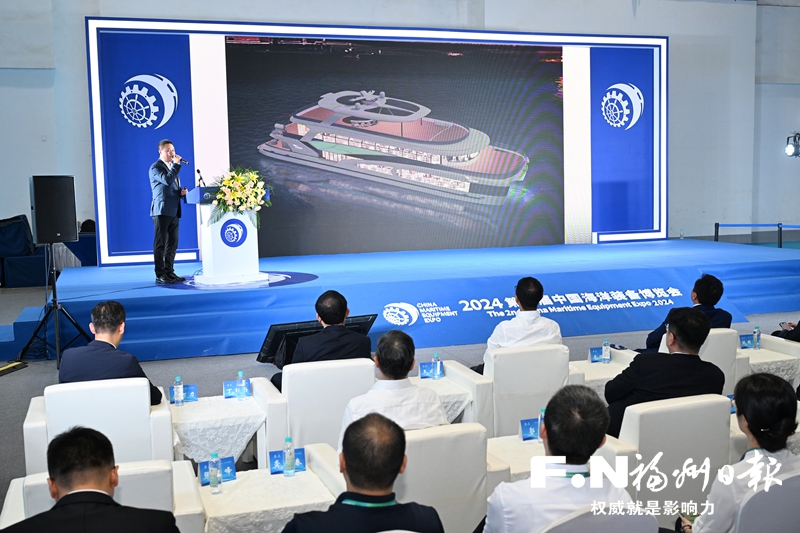Over 60% of every ten new global shipbuilding orders are placed in China. As a leading traditional industry, China's shipbuilding sector holds a competitive edge. Yet, in the face of evolving circumstances and new developmental opportunities, how can this maritime giant continue to forge ahead and strengthen its position on the seas? During the World Maritime Equipment Conference 2024 and the Second China Maritime Equipment Expo 2024, a series of forums and signing events were held. Through these activities, reporters explored the “new course” of quality improvement and upgrading within China's shipbuilding industry.

On-site Picture of Sustainable Development (ESG) Forum of the Shipbuilding Industry. Reporter: Ye Cheng / Photography
Accelerating Intelligent Transformation and Digital Reform
Climbing Toward High-End Shipbuilding
“XH DREAM”, an 82,600-ton bulk carrier (No.34), was delivered 95 days ahead of schedule, while the 62,000-ton multipurpose heavy-lift vessel No.8 with a full-hatch cover was handed over 153 days early. During the Shipbuilding Digitization and Intelligent Process Empowerment Forum, Yan Xingchun, Director of the Comprehensive Technology Department at CSSC Chengxi Shipyard Co., Ltd., showcased these delivery milestones to highlight how intelligent manufacturing is driving enterprise transformation and upgrading.
As coastal shipyards thrive in the digital intelligent transformation of shipbuilding, how can inland shipbuilders carve their path? Li Zhengjian, Chief Expert and Senior Engineer at the Chinese Society of Naval Architects and Marine Engineers, provided an answer with the “Lighthouse Factory” – the Green Intelligent Factory Project for New Energy Ships. This project, benchmarking against sea-going ship production processes, employs self-controlled intelligent solutions to build digital workshops and smart factories, forging a new path for the digital and intelligent transformation of inland shipbuilding.
Each innovation and every technological breakthrough demonstrates that digital transformation is essential for the shipbuilding industry to achieve high-quality development.
As Zhao Maolin, Manager of the Digital Intelligence Maritime Technology Department at Hexagon, emphasized, the shift to smart manufacturing has positively impacted operations, management, and execution within enterprises. He stressed the need to accelerate the industry’s digital transformation. However, he also noted that the journey is not without challenges, citing difficulties in applying emerging technologies, shortages of skilled professionals, insufficient funding for transformation, and concerns over data security and privacy.
To address these issues, Li Zhengjian recommended that the government enhance planning guidance and policy support, the industry foster collaborative cooperation and resource sharing, and enterprises clarify transformation goals and assume a leading role. “The shipbuilding industry is vast, high-quality, and full of potential. We must seize the momentum of digitization to empower the high-quality development of China’s shipbuilding sector.”
Driving Green Transformation
Exploring the Path to Sustainable Development
The shipbuilding industry is undergoing a profound green transformation.
According to Guan Liangqing, General Manager of Fujian Province Fuchuan Marine Engineering Technology Research Institute Co., Ltd., recent developments in new energy vessels have demonstrated diverse technological pathways. These include LNG, LPG, methanol, ammonia, hydrogen, batteries, nuclear energy, and wind power technologies, all aiming to achieve low or zero carbon emissions. “China should accelerate the development of zero-carbon ship models, the research and development of new engines for vessels using zero-carbon fuels, and ship-based carbon capture technologies. This will enable us to gain an early foothold in the zero-emission ship market and support the achievement of carbon peaking and carbon neutrality goals.”
The green transformation of China’s shipbuilding industry is not only a necessity for its development but also a strategic response to global economic integration. Xie Yu, Director of the International Department at the China Association of the National Shipbuilding Industry, said: “As a major shipbuilding nation, China offers abundant application scenarios that can serve as platforms for new concepts and technologies. We must strengthen international exchange and collaboration to jointly address challenges and promote the high-quality, sustainable development of the shipbuilding industry.”
Against the backdrop of global carbon reduction, electric vessels are emerging as a “green trend” in maritime transport. Tang Wenjun, Deputy General Manager of Wuhan Changjiang Ship Design Institute Co., Ltd., noted that as of July this year, over 700 electric vessels have been completed or are under construction in China, according to incomplete statistics. These vessels include passenger boats, bulk carriers, and small auxiliary vessels, with applications concentrated along the Yangtze River, Pearl River, Min River, the Grand Canal, inland lakes and rivers, islands, and coastal ports.
Reporters also noted that at the signing ceremony and new product launch hosted by Fujian Shipbuilding Industry Group, the focus on green technology was striking. “Currently, our affiliated shipbuilding enterprises hold orders for 113 vessels, with a contract value of approximately USD 5 billion. Among them, 34 are green energy vessels, valued at USD 2.344 billion, accounting for 46.88%,” shared Yu Hongjiang, Deputy Manager of the R&D Department at Fujian Province Fuchuan Marine Engineering Technology Research Institute Co., Ltd. As the largest shipbuilding enterprise in Fujian Province, Fujian Shipbuilding Industry Group has successively established specialized teams and facilities, including the LNG Ship Task Force, the Electric Vessel Task Force, the Electric Vessel Design Research Center, and the Electric Vessel Manufacturing and Assembly Base. Furthermore, they have implemented incentive mechanisms to support the research and development of new energy vessels, injecting momentum into the creation of a national demonstration zone for intelligent new energy vessels in Fujian Province.
Protecting Intellectual Property
Unlocking the “Passwords” to Global Competitiveness
“Intellectual property, as a core element of innovation-driven development, is critically important for enhancing the international competitiveness of China’s shipbuilding industry.” This consensus was reached by participants at the China Shipbuilding Intellectual Property High-Quality Development Forum held on November 17.
In the view of Wu Jie, Secretary-General of the China Shipbuilding and Ocean Engineering Industry Intellectual Property Alliance, protecting intellectual property is synonymous with protecting innovation, and safeguarding innovation means accelerating the development of new quality productive forces.
Looking back, China’s shipbuilding industry has achieved remarkable success in the field of intellectual property. From the early stages of technology introduction, digestion, and absorption to the current phase of independent innovation and breakthrough development, the country has gradually established a relatively comprehensive intellectual property system. Particularly in recent years, significant progress has been made in areas such as patent applications, trademark registrations, and copyright protection within the shipbuilding sector.
The China Shipbuilding Industry High-Quality Patent Development Index Report and the China Shipbuilding Industry Intellectual Property Development Report (2024), released during the forum, highlighted a substantial increase in both the quantity and quality of patents since the implementation of the National Intellectual Property Strategy in 2008.
Yao Xiao, Director of the Secretariat Office of the Intellectual Property Branch of the China Association of National Shipbuilding Industry, stated that China plays a significant role in global shipbuilding patent applications, and its influence in the global shipbuilding industry continues to grow.
“However, we must also recognize that the shipbuilding industry still faces many challenges in the realm of intellectual property,” noted Chen Wenbo, Deputy Secretary-General of the China Association of National Shipbuilding Industry. On one hand, international competition is intensifying, and technological barriers are becoming increasingly higher. On the other hand, there is still room for improvement in the application and protection of intellectual property.
Intellectual property plays a crucial role in developing new quality productive forces. In this regard, Professor Liao Yulei of Harbin Engineering University remarked: “We will focus on frontier technologies for marine robotics, further enhancing collaborative innovation across industry, academia, research, and application. By continuously producing high-value patents that are practical and effective, we aim to improve the application levels of unmanned marine equipment and contribute to the formation of new quality productive forces in the marine and shipbuilding sectors”. (Reporters: Yan Lanping and Fu Yijing / Text)







